The following is a transcript of Chef Rick Bayless’ acceptance speech upon receiving the prestigious Julia Child Award at the Smithsonian Institution’s Museum of American History in Washington, D.C. on Oct. 27. To read Good Food on Every Table’s coverage of the event, please click here.
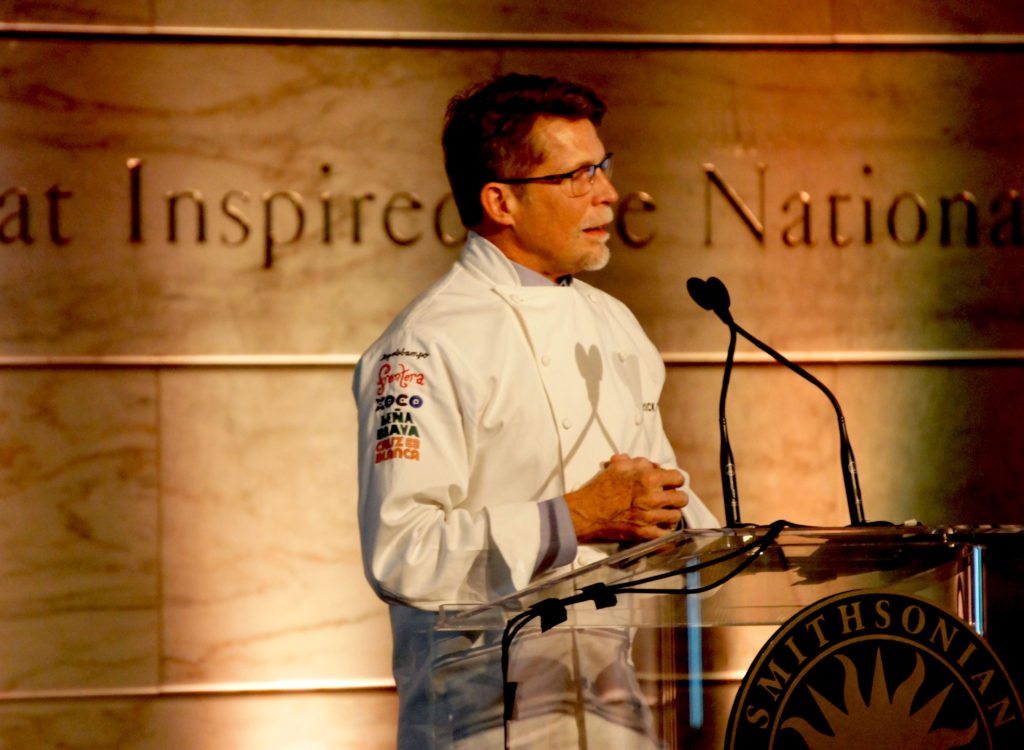
Rick Bayless — the Chicago chef who popularized regional Mexican cuisine in the United States through his restaurants, cooking shows and books — accepted the second Julia Child Foundation Award on Oct. 27. Bayless’ gracious acceptance speech focused mostly on Julia Child, the pioneering TV chef and cookbook author, who he credits for inspiring his career.
My family will tell you that I am never at a loss for words. And tonight I am at a loss for words. I can’t believe all this stuff is coming toward me, because I’m a person who likes to do and create and share.
I would rather get up here and tell you about the food that we served you, and how in Vera Cruz I discovered this great ceviche that we put on your plates tonight. How I learned to make Oaxacan black mole [sauce] and I spent 10 years perfecting it before I put it on our restaurant’s menu, because I didn’t think if we had a Oaxacan grandmother come through the door, she would be happy with my attempts, so I worked on it for 10 years and I finally felt really good about it. Or where the mesquite bean flour came from for chocolate cakes or how we ground the chocolate from cacao beans that were fully fermented in the state of Tabasco and shipped up to Chicago and we ground them into chocolate at our restaurant. That’s what I really love to do.
Tonight, this is an odd thing for me to sit here. It’s like “This is Your Life,” and go through all of the travels that my wife and I took through Mexico and all of the artifacts that we have donated here to the Smithsonian, which was one of the most grueling things that I have ever done. Because I’m kind of a pack rat, and I’m thinking about giving this stuff away, and I set it all out on a great big table and I put it on and pulled it back, I can do it, no I can’t. It was that kind of a thing.
And then to hear the glorious words of [chef] José Andrés, who is the complete embodiment of what makes this country great. And to listen to Scott [Simon of NPR] recounting all of the times that we have shared, special occasions together at our restaurant. It’s almost a tidal wave of experiences that is too great for me to truly comprehend right now.
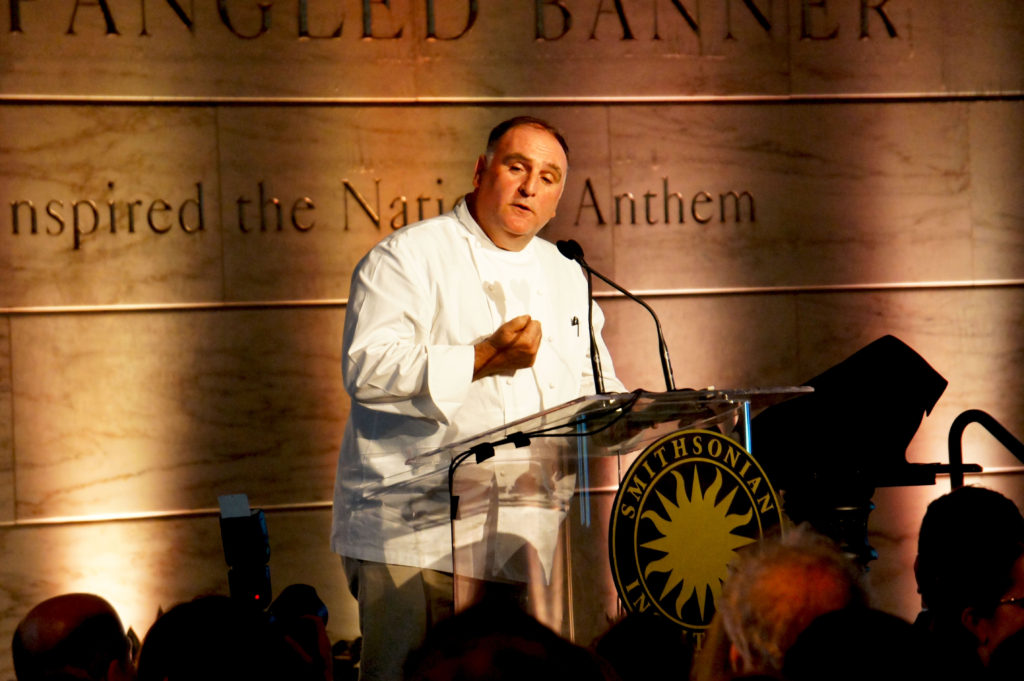
José Andrés — the Spanish-born chef best known for Washington, D.C., mainstays such as Jaleo, Minibar and Oyamel — spoke at the Julia Child Awards ceremony about food’s role in the American and immigrant experience.
So I think it should all be about Julia, okay? I will tell you that without Julia, I would not be here today.
I would never wish the young Rick Bayless on any family. I was such a handful because I was so curious and I was so interested in creating things that I always had constant projects going on.
I grew up in the barbecue restaurant that you saw, but my favorite thing to do was to spend Saturdays at the restaurant and hang out in the back in the prep kitchen, and I would make my creations. I would go into the walk-in where all the mise en place was, and I’d pull stuff out and I’d mix it together and put it in an oven and bake it or whatever, because I wanted to create something. And I loved the creative aspect of cooking, even though I was 7 or 8 years old and I was making stuff that no one could stomach, even me.
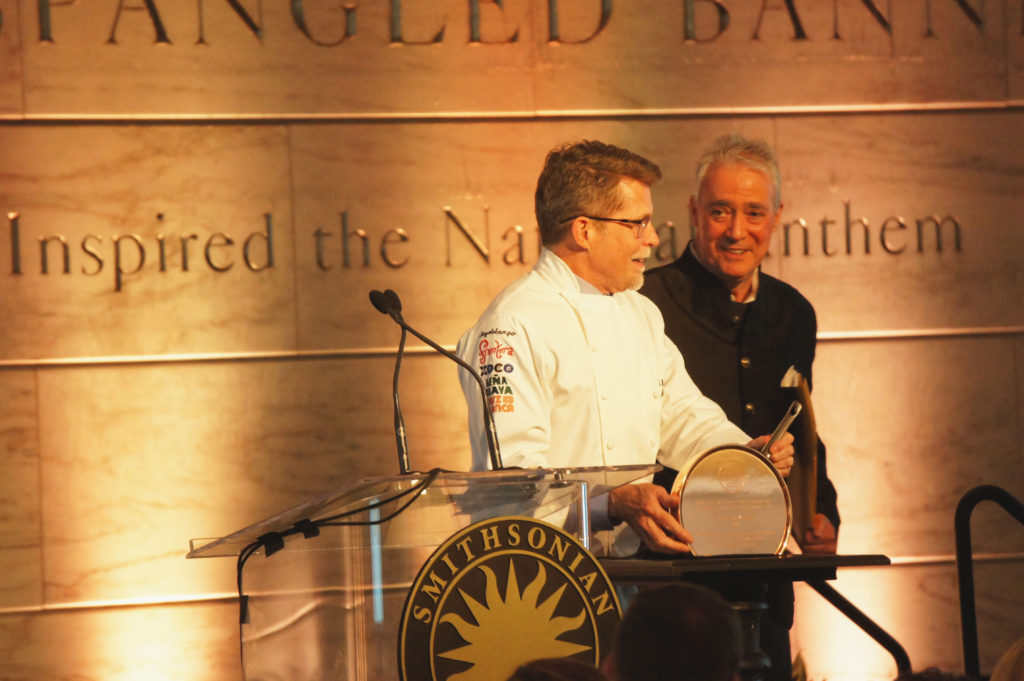
Rick Bayless poses with his Julia Child Award — fashioned after one of the namesake’s trademark copper pans — as Scott Simon of National Public Radio looks on. Simon introduced Bayless, a close personal friend, at the event.
And when I was 10, Julia came on the TV, and she opened doors for me that I never would have had opened if it hadn’t been for her shows. I did sit in front of a little black and white TV and write down, I still have the notebook of all of the recipes that I wrote down from those early shows.
Going beyond that, when I was 12, I petitioned my parents for the first edition of Julia Child’s Mastering The Art of French Cooking. And over a period of three years, I cooked every dish in it. I will never forget the napoleons when I was 13. You have to make puff pastry, which is not exactly a 13-year-old’s kind of attempt, and I made the puff pastry, it took me two days, three days to make, and at the end of it, nobody in my house wanted to eat it. But I was totally satisfied with having created this glorious thing that Julia had inspired me to do.
And it was the precision that she brought to it and the comfort that she brought to anybody wanting to create something like this. Those two things, the precision and that comfortable approach, that was so inspiring to me.
I don’t know if my mother was super-happy when I watched Julia make lamb chops, and of course I was just was just in my early teens, and I called the one fancy grocery store in town that delivered and I ordered lamb chops from them, and I knew where she kept her extra money. That did not go over well in my house. I’d seen Julia cook live lobster on TV, so I took a little burner and a live lobster to my 7th grade civics class. Today you could go to jail for that. And it’s all because Julia gave me the confidence to do what I wanted to do.
And she gave that to so many people. When young chefs come up to me and say things like, “You inspired me to culinary school and to really mine our family’s culinary history,” that’s what I could say to Julia.
Julia didn’t teach me to be a French cook. She taught me to cook. My love was for Mexico and I could take what she taught me to Mexico and do the work that was right for me to do.
Julia changed the way we wrote cookbooks. She completely changed it! And it was studying her books and reading them and cooking through them that allowed me to take that knowledge and go to Mexico and seriously study, as you saw in the notes that were projected here on the screen, and be able to really delve deeply into and respect the culture that created that cuisine. Not just learning about a recipe, but to learn what motivated the creation of that recipe. And that’s what Julia did.
When you’re talking about television, I did my first series of television shows in 1979. Thankfully you can’t see them anywhere on You Tube. I did 26 shows for public television and they were all studio shows.
I’d lived in Mexico, I’d gone down to do research for these shows, and then I sat down and watched every show that I could get my hands on of Julia’s. I got the VHS tapes, plugged them into the VCR, and I watched them over and over and over again, because she was a master at communicating information. Real information, not just like, let’s skip across the top of this. She could teach you how to grab the essence of something and put it out there in a way that everybody could understand. It was her ability to make everybody go into the kitchen and cook because they wanted to, to write recipes, to communicate through television, that is all the reason why I am here today.
I say a lot that I have chosen the most wonderful profession in the world. I am a restaurant chef, first and foremost. I grew up in a restaurant and I have always loved the restaurant world. I often hear people talk about the ugly side of the restaurant world, but there is this glorious side.
Every single day we have this incredible opportunity to create magic for people. Sometimes we don’t even know what’s going on in our restaurants. There could be a proposal at a table, and we don’t know about it. Or a reunion of people who have been estranged and have come back together at our restaurant. Or a celebration. We get to host that every single day. And we get to offer food that can be the catalyst for this amazing experience to happen. Who doesn’t want that as a profession? And Julia was the one who welcomed everybody to the table.
I was like the biggest Julia fan and had memorized recipes and her books, and there was this one book that she did called From Julia’s Kitchen, and it had all of the layout of her kitchen and everything. I memorized it all, and then I had the opportunity to actually be on the late series of shows that she did from that kitchen. And when I walked into it, it was like an out of body experience because I knew where everything was.
And I found where the lemon tart sat when she photographed it on the table, or the boeuf bourguignon and how it looked when she had that great big casserole dish and she heaped it into that. I could see all of that stuff, like the ghosts of these glorious things, and I thought about how she had created for me the opportunity to share all of that with my loved ones and then eventually the people who come to our restaurants.
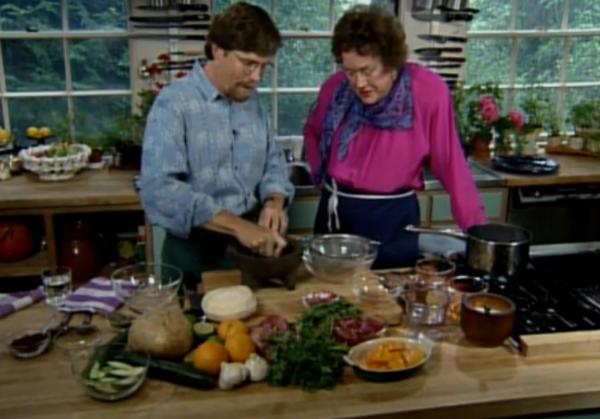
Rick Bayless prepared a rustic jicama salad on Julia Child’s cooking show in 1992, four years after he opened Chicago’s Frontera Grill. Bayless, who idolized Child from childhood, describes cooking with Child in her kitchen as an “out of body experience.” Screen shot from PBS video.
I am so incredibly honored, I want to thank the Julia Child Foundation and the National Museum. This place is so spectacular. It’s hard for me to even be in this museum, because it’s palpable, the history of this great country all around you. Not palpable in big things, but in little things in people’s lives, and that’s what we do when we share food with people. We share a little something that’s from me to you, and it’s something that will live on for a long time in our memories. And that’s what we’re surrounded with in this beautiful museum.
To all of you, to my lovely family that has joined me here tonight, all of you as well, for being part of this for supporting the Julia Child Foundation, for creating places where we can share food with each other, and recognize how it’s that connection, through one of the most elemental things of life, that can be the most lasting in our memories. This is one of the most amazing moments of my life, thank you all very much.
Photographs by Bob Benenson/FamilyFarmed
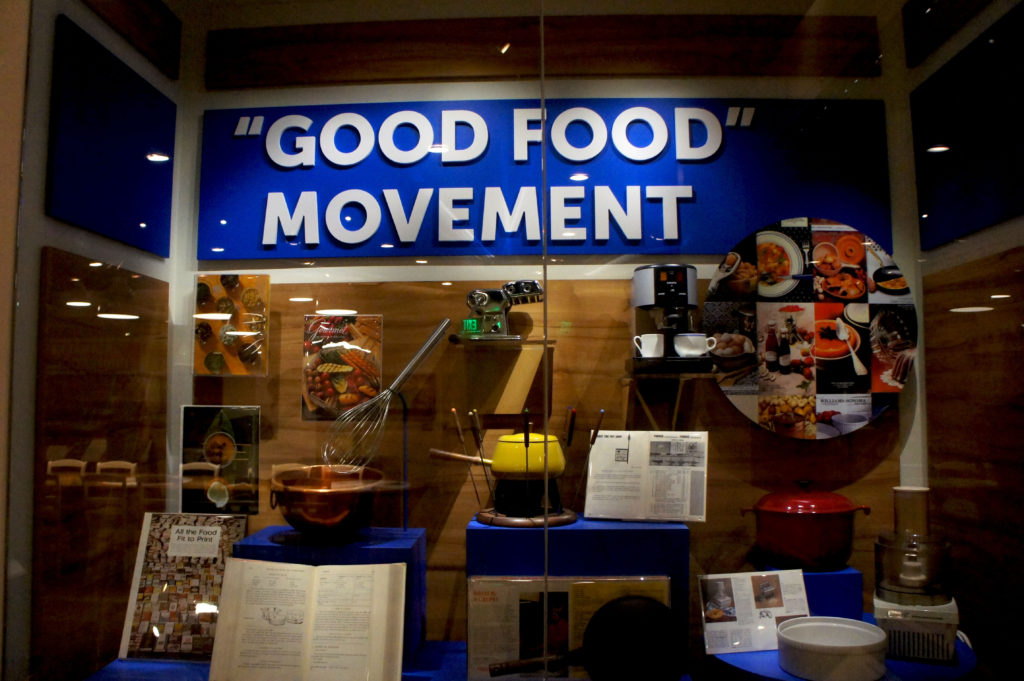
The extensive Food in America section at the Smithsonian Institution’s Museum of American History includes an exhibit with words familiar to Rick Bayless and FamilyFarmed: Good Food movement. The Food section, the permanent home of the late Julia Child’s famous kitchen, now includes a showcase of artifacts from Bayless’ culinary career.
